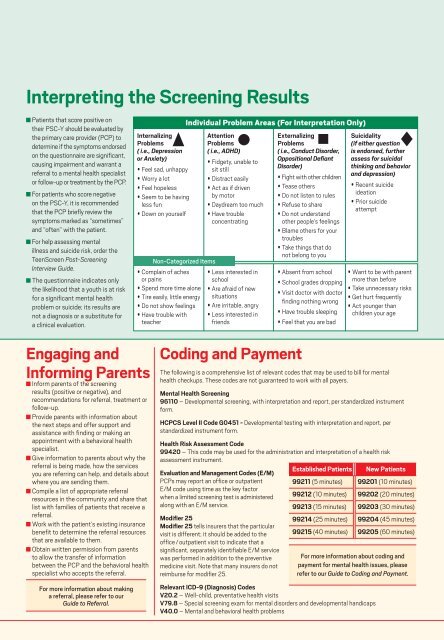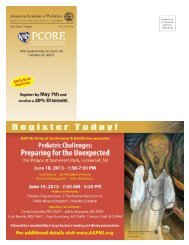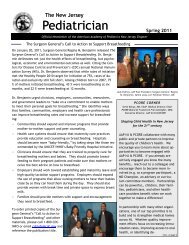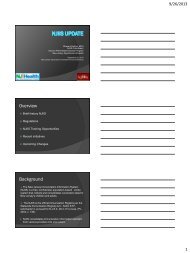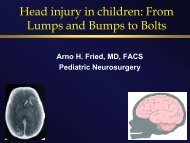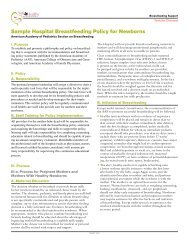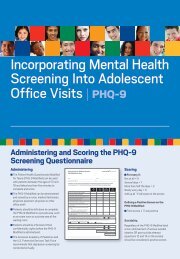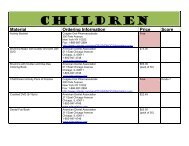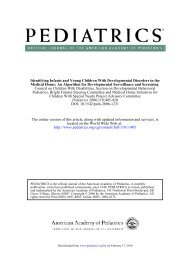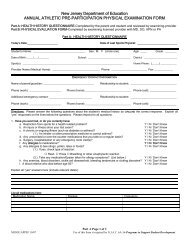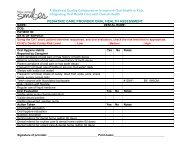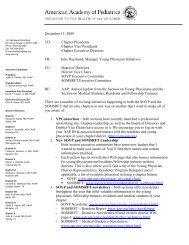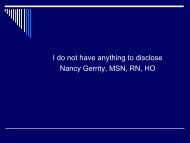PSC-Y - New Jersey Chapter, American Academy of Pediatrics
PSC-Y - New Jersey Chapter, American Academy of Pediatrics
PSC-Y - New Jersey Chapter, American Academy of Pediatrics
Create successful ePaper yourself
Turn your PDF publications into a flip-book with our unique Google optimized e-Paper software.
Interpreting the Screening Results<br />
Patients that score positive on<br />
their <strong>PSC</strong>-Y should be evaluated by<br />
the primary care provider (PCP) to<br />
determine if the symptoms endorsed<br />
on the questionnaire are significant,<br />
causing impairment and warrant a<br />
referral to a mental health specialist<br />
or follow-up or treatment by the PCP.<br />
For patients who score negative<br />
on the <strong>PSC</strong>-Y, it is recommended<br />
that the PCP briefly review the<br />
symptoms marked as “sometimes”<br />
and “<strong>of</strong>ten” with the patient.<br />
For help assessing mental<br />
illness and suicide risk, order the<br />
TeenScreen Post-Screening<br />
Interview Guide.<br />
The questionnaire indicates only<br />
the likelihood that a youth is at risk<br />
for a significant mental health<br />
problem or suicide; its results are<br />
not a diagnosis or a substitute for<br />
a clinical evaluation.<br />
Internalizing<br />
Problems<br />
( i.e., Depression<br />
or Anxiety)<br />
• Feel sad, unhappy<br />
• Worry a lot<br />
• Feel hopeless<br />
• Seem to be having<br />
less fun<br />
• Down on yourself<br />
Non-Categorized Items<br />
• Complain <strong>of</strong> aches<br />
or pains<br />
• Spend more time alone<br />
• Tire easily, little energy<br />
• Do not show feelings<br />
• Have trouble with<br />
teacher<br />
Individual Problem Areas (For Interpretation Only)<br />
Attention<br />
Problems<br />
( i.e., ADHD)<br />
• Fidgety, unable to<br />
sit still<br />
• Distract easily<br />
• Act as if driven<br />
by motor<br />
• Daydream too much<br />
• Have trouble<br />
concentrating<br />
• Less interested in<br />
school<br />
• Are afraid <strong>of</strong> new<br />
situations<br />
• Are irritable, angry<br />
• Less interested in<br />
friends<br />
Externalizing<br />
Problems<br />
( i.e., Conduct Disorder,<br />
Oppositional Defiant<br />
Disorder)<br />
• Fight with other children<br />
• Tease others<br />
• Do not listen to rules<br />
• Refuse to share<br />
• Do not understand<br />
other people’s feelings<br />
• Blame others for your<br />
troubles<br />
• Take things that do<br />
not belong to you<br />
• Absent from school<br />
• School grades dropping<br />
• Visit doctor with doctor<br />
finding nothing wrong<br />
• Have trouble sleeping<br />
• Feel that you are bad<br />
Suicidality<br />
(if either question<br />
is endorsed, further<br />
assess for suicidal<br />
thinking and behavior<br />
and depression)<br />
• Recent suicide<br />
ideation<br />
• Prior suicide<br />
attempt<br />
• Want to be with parent<br />
more than before<br />
• Take unnecessary risks<br />
• Get hurt frequently<br />
• Act younger than<br />
children your age<br />
Engaging and<br />
Informing Parents<br />
Inform parents <strong>of</strong> the screening<br />
results (positive or negative), and<br />
recommendations for referral, treatment or<br />
follow-up.<br />
Provide parents with information about<br />
the next steps and <strong>of</strong>fer support and<br />
assistance with finding or making an<br />
appointment with a behavioral health<br />
specialist.<br />
Give information to parents about why the<br />
referral is being made, how the services<br />
you are referring can help, and details about<br />
where you are sending them.<br />
Compile a list <strong>of</strong> appropriate referral<br />
resources in the community and share that<br />
list with families <strong>of</strong> patients that receive a<br />
referral.<br />
Work with the patient’s existing insurance<br />
benefit to determine the referral resources<br />
that are available to them.<br />
Obtain written permission from parents<br />
to allow the transfer <strong>of</strong> information<br />
between the PCP and the behavioral health<br />
specialist who accepts the referral.<br />
For more information about making<br />
a referral, please refer to our<br />
Guide to Referral.<br />
Coding and Payment<br />
The following is a comprehensive list <strong>of</strong> relevant codes that may be used to bill for mental<br />
health checkups. These codes are not guaranteed to work with all payers.<br />
Mental Health Screening<br />
96110 – Developmental screening, with interpretation and report, per standardized instrument<br />
form.<br />
HCPCS Level II Code G0451 - Developmental testing with interpretation and report, per<br />
standardized instrument form.<br />
Health Risk Assessment Code<br />
99420 – This code may be used for the administration and interpretation <strong>of</strong> a health risk<br />
assessment instrument.<br />
Evaluation and Management Codes (E/M)<br />
PCPs may report an <strong>of</strong>fice or outpatient<br />
E/M code using time as the key factor<br />
when a limited screening test is administered<br />
along with an E/M service.<br />
Modifier 25<br />
Modifier 25 tells insurers that the particular<br />
visit is different; it should be added to the<br />
<strong>of</strong>fice / outpatient visit to indicate that a<br />
significant, separately identifiable E/M service<br />
was performed in addition to the preventive<br />
medicine visit. Note that many insurers do not<br />
reimburse for modifier 25.<br />
Established Patients<br />
Relevant ICD-9 (Diagnosis) Codes<br />
V20.2 – Well-child, preventative health visits<br />
V79.8 – Special screening exam for mental disorders and developmental handicaps<br />
V40.0 – Mental and behavioral health problems<br />
<strong>New</strong> Patients<br />
99211 (5 minutes) 99201 (10 minutes)<br />
99212 (10 minutes) 99202 (20 minutes)<br />
99213 (15 minutes) 99203 (30 minutes)<br />
99214 (25 minutes) 99204 (45 minutes)<br />
99215 (40 minutes) 99205 (60 minutes)<br />
For more information about coding and<br />
payment for mental health issues, please<br />
refer to our Guide to Coding and Payment.


